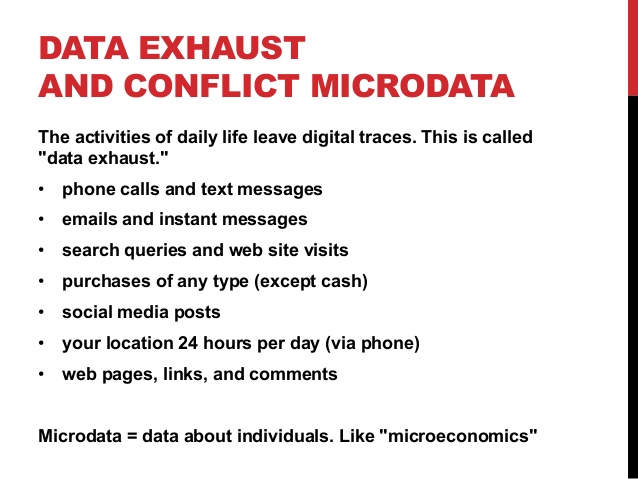What method are you going to use to discern truth from now on?
- threekeysposted 7 years ago
0
I listened to a australian authour give a speech within the last 24 hours. While I found his monotone voice making me want to walk away a few things he said stuck with me. Surprisingly he and I shared a similar outlook on a number of issues, which was comforting to me to see that I am not alone in my views.
While I cannot go into everything he comented on. These two things I want to mention and open up a discussion. It may have been already covered but....
He spoke about Cambridge Analytica. All the research going into the mind we a ofering free informaiton for authourities to "get inside our heads" via psychological profiles via facebook and all social media sites. Using this information not to "persuade" usanymore but to get to know our deepest deepest fears and "manipulate" us based on those most hidden fears.
The authour mentoined this, which was a huge distinction for me."Lies are quick to come and the truth is slow to rise.But once you hear the truth you know instinctively its right."
Also, propaganda is about dissemintating lies (that is, information that only needs to sound believable, its not true, but just needs to sound believable=propaganda)
This is what happened in your last election process.
So, how are you personally going to discern what is the truth and what is propaganda? Are you going to continue with Facebook?I find it really pretty hilarious that many are seriously considering that Face -Book actually WAS a reliable source of any kind of news media what -so -ever . The title here really speaks entire volumes and shines a bright light on the strange phenomena that you actually DID get your "truth" from there, really ? What that tells me about today's social media fed mass youth hysteria , is that it's no surprise so many of you bought it lock, stock and barrel ?
I 100% agree with you here. I hesitate in taking news from reputable organizations at face-value, let alone posts on Facebook.
I'm finding that more and more you have to do the research yourself. It's more work, but you get a much better picture.One of the most important goals in modern propaganda is getting people to distrust everyone and everything except for one authoritarian source.
Interesting. I don't typically care for the source of my information - I'll listen to anyone, but with a healthy dose of skepticism.
If you're suggesting my general distrust makes me prone to trusting an authoritarian source, I'd like to know how they'd succeed. Do you have any examples in mind?I did not say and I'm not suggesting at all that you personally are prone to trusting an authoritarian source. I'm simply saying it's a goal of propaganda.
People lose trust in "the media" because "the media" has broadened into such a wide array of possibilities -- including blogs and social media -- that the term doesn't mean diddly anymore.
Newspapers (and their websites) follow certain rules because they get sued if they don't. Blogs, social media and cable news don't follow those rules. People who mix all of them together are misunderstanding how they all work.
No newspaper is perfect. But good newspapers fact check thoroughly. If they don't, they can lose millions of dollars in a single lawsuit.That's clarifying.
So if anything follow the newspapers? But it could it be if you had a monopoly over newspapers (e.g. once upon a time Rupert Murdoch) you could influence the slant of stories via your chosen view. Together with the help of media lawyers Owners of newspapers can walk the fine line between truth and propaganda (what is believable?)There is an important difference between the news section of the paper and the editorial page. Publishers and newspaper owners often will influence the editorial page in one direction or another.
They have little influence over the news content for a simple reason. News stories often get written and published so quickly that there is no time to send one up the ladder and back down again.
I will say it's important to track news from multiple sources, starting with the most credible newspapers. And again, no newspaper article is perfect because they are written and edited by imperfect human beings.
Also, some newspapers are garbage, like the National Enquirer. If you want to know which ones have the highest standards, check out the Pulitzer Prizes.
http://www.pulitzer.org/
Do you have any evidence of that? My hunch is that there is more at play than just misunderstanding the function of social media.
According to Pew Polls only 5% of American adults have a high trust in social media, even though 18% of American adults get their news often from social media. For comparison, national news orgs and local news are highly trusted by 20% and 25% of American adults, respectively. At best it's a small minority that conflates social media with actual news sources, and this will vary depending on the social media they're consuming - only 14% of Vine users get news from the site, compared to 70% of Reddit users.
Overall, most US adults don't seem to be under any delusions about the function and reputability of news from social media.You are opening the door to a massively complicated discussion about media. For example, that 18% of people who get their news from social media often get it from newspaper Facebook pages. I know because I managed newspaper social media accounts with hundreds of thousands of followers during my career.
You end up with wildly varying levels of trust depending on which Facebook page that people follow.
If you break down the trust numbers from Pew and other sources, you'll find that "national news orgs" often don't differentiate between newspapers and news channels.
The trust numbers also are remarkably different among political affiliations. Even more telling, trust in all media by Republican voters started diving deeply after the arrival of Fox News.
During nearly 4 decades in the media business, I can't recall meeting anyone who knew that newspapers and TV stations follow very different rules in their reporting.
I'll add that Reddit, which I use, is a much different animal because it is simply a list of links to outside media sources. Unlike newspapers, there is no control over what gets posted. It goes to my point that "the media" is so broad anymore that it's almost a meaningless term.
Maybe we should narrow this down to more specific issues.My issue was specific - where is the evidence that people are misunderstanding social media to the point where they conflate "the media" with a random blog on the internet? And that this is responsible for the lowered trust in media?
As I pointed out, only 5% trust social media vs. 20% trusting national news orgs, so clearly people are capable of distinguishing the two. We can differentiate between newspapers and news channels if you like, but I don't see either having as low a trust as 5%, so it seems to be a moot point.
And yes, their trust will vary depending on the Facebook page (newspaper or otherwise). That just lends further credence to the point that most people do not blindly conflate every source of news as "the media" - they categorize them based on differing levels of trust.
I have not heard of any Reddit user that thinks Reddit is part of "the media." Reddit is a site for, among other things, news aggregation and discussion. It should not be seen as a newspaper. Why should there be any controls over what news get aggregated and discussed? Is there control over what newspapers I should buy and collect, or what I am allowed to discuss at the dinner table?
I can understand a conflation between newspapers and TV stations, but not newspapers and Reddit. For what it's worth, I didn't know the difference until you pointed it out, but I classified newspapers as one step above TV stations just from observing the different standards of reporting.I think I'm trying to say your specific issue is broader than it appears.
Pew research actually shows 34% trust social media "a lot" or "some". That 5% number only refers to "a lot". The 34% total is about 47 million people in the U.S., and I believe it supports my origial point. It also explains why Cambridge Analytica and other companies were so determined to steal personal data for tens of millions of people and use it during the election.
I acknowlege your point that many people distinguish the credibility of Facebook information in general from Washington Post articles. But the research shows that millions more don't distinguish between the two.
Regarding Reddit, you correctly describe it as a "news aggregation" site. Yes, it is not a newspaper. It does not publish news articles, but it distributes news headlines. Its purpose is media sharing. I think most journalists and online professionals I know would agree it's a media site.I made a point to specify "high trust" in my first post but neglected that on the second. Oops. But yes, the 5% is only a lot, and 33% is "some" or "a lot". As skeptical as I can be, even I trust "some" of the news that I find on Facebook. It's not as indicative of blind trust as the "a lot" group.
For comparison, 72% trust national news orgs as "some" or "a lot" and 85% trust local news orgs.
Or to put it another way, 63% of people don't trust social media at all. Only 28% don't trust national news orgs and 15% for local news orgs.
I think the biggest reason Cambridge Analytica (and Facebook itself, for that matter) is not because people inherently trust social media (63% don't), but rather how often they use it. It may be that over time, and with carefully tailored news, people would begin to trust it more blindly because it appeals to their preconceptions of the world. As of right now, I don't think that's the case, but it's certainly a possibility.
I agree that it's a media site, I just wouldn't classify it as part of "the media." That term has the implication of classical or mainstream news media, in my mind at least. I'm not sure if I'd classify Reddit as part of alternative media either, unless we're willing to classify discussion boards as part of alternative media.
I will say that there may be more conflation of those terms than I thought and it might not be that easy to define "the media" - it helps to define what "alternative media" is as a contrast. And certainly people like Trump intentionally conflate those terms for their own benefit.Excellent points. Key phrase that I picked up wad "carefully tailored news" which different term canbe used, "Online Behavioral Advertising (OBA)".
youtube, Google, and FB - etal all use this.All valid points. I noticed "high trust" in the first post. I thought it was relevant to point out the number of people who trust social media at least "some".
I grant to you that a large percentage of people either don't trust social media and / or distinguish the difference in purpose between newspapers and Facebook.
I hope you will grant to me that a significant percentage don't see enough difference between the two and therefore trust social media more than they should.
And quite a few trust newspapers less than they should. I'll add to that sentence the fact that there should be a limit to trust in any form of media. All humans and all human systems are imperfect.Absolutely. I think 5% having "a lot" of trust in social media is plenty significant. And like I alluded to earlier, I'm finding more and more examples of people having difficulty defining "the media" and conflating different types of media.
Going back to your original point, we can assume that some percentage of that 5% that highly trust social media conflate social media with reputable news organization. In other words, this is a sort of "positive" conflation - these people trust social media because they trust news organizations and think they're the same.
To confirm your claim, we need to find the % of "negative" conflation - that is, people who conflate reputable news organizations with social media and as a result have lower trust in news organizations. If we can find that, we can see how much of that "negative" conflation has had a negative impact in the general perception of media trust.
Promisem with over 4 decades experience in the social media and news areas? Please take over the discussion. I opened up the discussion from a generalist point of view. For specifics? Im out of my depth but my ears prick up with Pew's findings and I have grazed Redit. How and where do you suggest to focus our discussion?
ThreeKeys, I think you have done a great job of raising questions and trying to be open minded. You're the OP. I'm happy to follow your lead or discuss these questions with anyone else.
I cancelled my Facebook account immediately when I heard about how they use data. The internet is a powerful tool. Be careful about what you reveal about yourself and your family and friends.
Regarding propaganda - sadly there will always be people who are susceptible. That is how tyrants gain power and how people like Hitler rose to power and still emerge in our world. Separating truth from lies is difficult. All we can do is try to stay abreast of current affairs through a broad range of media, form our opinions from facts rather than rhetoric, and act (and vote) according to our conscience.Yes listen/read to a wide variety of news/information sources is about the best we can do. I hate the sneakiness of "propaganda". That is making stories to sound just "believable/plausible".
We have to be mindful of not repeating history.
I think Facebook is on their way out. They have had a really good run for a long long time.Deleting FB does nothing. FB tracks non-users.
"Facebook gets some data on non-users from people on its network, such as when a user uploads email addresses of friends. Other information comes from “cookies,” small files stored via a browser and used by Facebook and others to track ... "https://www.reuters.com/article/us-facebook-privacy-tracking/facebook-fuels-broad-privacy-debate-by-tracking-non-users-idUSKBN1HM0DR
You can clear you history daily if use Chrome which won't allow shutting off History
You can use Firefox and turn the History off.
You can use Opera and turn on the built in VPN on it.
You can download Tor but then the US funds 1/2 of that network so unless a router there's no hiding. With the new law you can be charged criminally just for passing encrypted packets.
http://hub.me/affWp
“ .. any analyst at any time can target anyone … I, sitting at my desk, certainly have the authorities to wiretap anyone — from you or your accountant, to a federal judge, to even the President. .... I can get your emails, passwords, phone records, credit cards” - Edward Snowden
"Cross-browser fingerprinting is only the latest trick developers have come up with to track people who visit their sites. " - https://arstechnica.com/security/2017/0 … -browsers/
Some helpful ideas and yet there seems to be no escaping the footprints.
But if we could abstain in some way or reduce or chip away at our footprints relentlessly could that be a effective start?
I was just thinking of the circle where while businesses and workers need each other. However if all workers didnt turn up to their job the business comes to a grinding halt-all due to a withdrawal.
Mine's gone. The 14 day 'think it over' period is almost done. Yay. I never used it much anyway.
Great post, thanks for sharing. Use many of these methods and tactics myself. Personally I like focusing on back links from secure sites.Thanks for sharing this content. I have been using many of these techniques and having success with them. There are a few you mentioned that I will test out also. I’m looking forward to implementing these.
- ahorsebackposted 7 years ago
0
Once there was a real need in America for media , a media of accuracy , integrity and honesty , The left has whined for decades about free speech . Maybe it'll happen that we end up with a government run media if the free media cannot be a "truthful "one that sells it's soul to sensation and speculation .
The United States Dept. of Media Accuracy ?
Which do Americans Trust the most ,today's or tomorrow's ? - ahorsebackposted 7 years ago
0
The Russian Pravda in America today ,likely more trustworthy than today's combined U.S news media . One good reason for "collusion ".
If not a free and trustworthy media , how much worse a Pravda ? - ahorsebackposted 7 years ago
0
Just keep believing your own media ,for instance , Hillary just offered excuse number fifty seven for her corrupted election failure ---"They were never going to let me become the president " .......anybody see how she never should have been president anyways yet the majority of news media did ?

Related Discussions
- 9
Where do people get their news? Who is it? Trust?
by tsmog 20 months ago
With a recent OP/Topic about ‘X’ my curiosity was piqued and went on an adventure. First I sought what social media sites are popular. I arrived with a Pew Research study/article; Americans’ Social Media Use (Jan 31, 2024).https://www.pewresearch.org/internet/20 … 01n40SKUAY The results...
- 96
Free Speech and the Importance of X
by Ken Burgess 20 months ago
In a free society, all citizens must be able to pursue their own paths, set their own goals, and think for themselves.In America people are free to express their ideas, even if those ideas are unpopular, unconventional, or wrong... in recent years our government, in collusion with Social Media...
- 32
Should Social Media Have Th Power of Censorship
by ga anderson 4 years ago
In light of the recent Twitter/facebook NY Post censorship controversy, and as a nod to Savvydating's thought about the current power of Social Media, (read; facebook, Twitter, Google), I have some thoughts about the power of our predominate social media networks..But first, these thoughts aren't...
- 11
Do you pursue truth from media?
by Heidi 13 years ago
Do you pursue truth from media?Often, I feel like I am reading an editiorial rather than a news piece. I have found myself having to research what I read in news articles. Do you fact check the news, or take it at face value?
- 18
Hillary Clinton’s Propaganda Remarks Raise Free Speech Concerns
by Sharlee 13 months ago
Photo from Bing Free to use files.I hope my opinion piece will spark meaningful discussion and provide food for thoughtHillary Clinton has recently sparked controversy with comments regarding the potential criminal or civil punishment of Americans spreading propaganda, particularly that connected...
- 65
Why Does the Mainstream Media Keep Falling for Obvious Hoaxes?
by Readmikenow 6 years ago
Too many people working in the reporting field fall for hoaxes. They rush to judgment and do real damage. Should they be required to apologize for their unprofessional behavior?“There's been much commentary in the past few days about the MSM's lack of critical thinking skills in...











